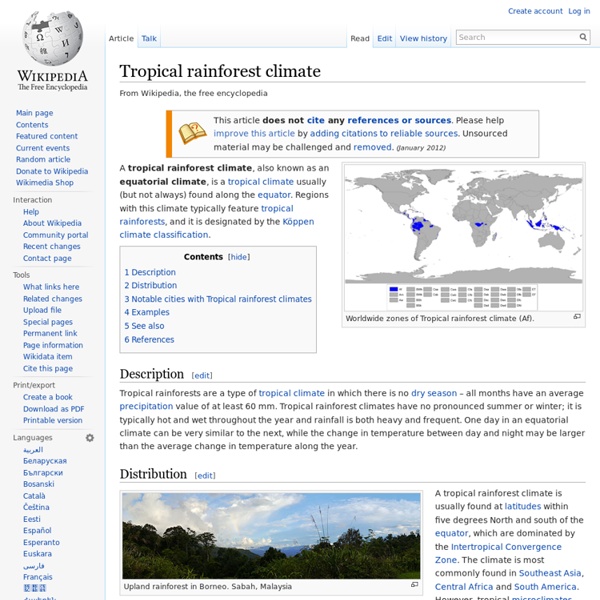The average temperature in the rainforest is about 30C, 80F it changer very little through out the year
Tropical Rainforest The rainforest that we have chosen to do our project on is in and is called the Amazon Rainforest. You can see on the picture in the upper left corner that the Amazon is the dark green area on the map. This zone which covers much of the northern half of that is east of the and north of the which centers at the equator. It extends through large parts of . In an average year in a tropical rainforest, the climate is very humid do to all of the rain which amounts to about 250cm per year. The climate is found near the equator. 40o F. This is red fungus (Pycnoporus sanguineus) these would be classified in the Fungi kingdom. This is white fungus (Lentinus) and it would be classified in the Fungi kingdom. This is the fern leaf. This is the Cattleya Plant. This is the Toco Toucan. This is the vampire bat. This is Euglena. This is an Actinopod. Howler Monkey The howler monkey is the loudest monkey in the rainforest. The howler monkey can get up to 2ft and there tail 30”. 1. 2.
The Plants of the Rainforest
A tropical greenhouse More than two thirds of the world's plant species are found in the tropical rainforests: plants that provide shelter and food for rainforest animals as well as taking part in the gas exchanges which provide much of the world's oxygen supply. Rainforest plants live in a warm humid environment that allows an enormous variation rare in more temperate climates: some like the orchids have beautiful flowers adapted to attract the profusion of forest insects. Competition at ground level for light and food has lead to evolution of plants which live on the branches of other plants, or even strangle large trees to fight for survival. The aerial plants often gather nourishment from the air itself using so-called 'air roots';.
KDE Santa Barbara
Location | Weather | Plants | Animals | People | Links LOCATION: There are two types of rainforest biomes: temperate and tropical rainforests. Temperate rainforests are found along coasts in temperate regions. WEATHER: Rainforests are important because they help maintain global weather patterns and rain. Tropical rainforests are lush and warm all year long! Temperate rainforests are also wet, but not as rainy as tropical rainforests. PLANTS: One type of plant often found in a rainforest is an epiphyte. There are about 10 -2 0 species of trees in temperate rainforests that are mostly coniferous, meaning they have needles. Most trees in tropical rainforests have thin, smooth bark. Tropical rainforests are so big that they are divided into four zones. ANIMALS: Tropical rainforests are home to half the plant and animal species on Earth. for at least 100 million years, ever since dinosaurs roamed the earth. In temperate rainforests you’ll find a different set of amazing animals. Mongabay.com
Rainforest Biomes
The tropical rain forest is a forest of tall trees in a region of year-round warmth. An average of 50 to 260 inches (125 to 660 cm.) of rain falls yearly. Rain forests belong to the tropical wet climate group. The temperature in a rain forest rarely gets higher than 93 °F (34 °C) or drops below 68 °F (20 °C); average humidity is between 77 and 88%; rainfall is often more than 100 inches a year. Rainforests now cover less than 6% of Earth's land surface. A tropical rain forest has more kinds of trees than any other area in the world. About 1/4 of all the medicines we use come from rainforest plants. All tropical rain forests resemble one another in some ways. Despite these differences, each of the three largest rainforests--the American, the African, and the Asian--has a different group of animal and plant species. Layers of the Rainforest There are four very distinct layers of trees in a tropical rain forest. Plant Life The air beneath the lower canopy is almost always humid. Animal Life
Tropical Rain Forest
As you can see from the map to the right, the tropical rainforests are, indeed, located in the tropics, a band around the equator from 23.5 N (the Tropic of Cancer) to 23.5 S (the Tropic of Capricorn) (red lines on map, right). Because the Earth tilts 23.5 degrees on its axis as it travels around the sun, at some point in the year (the solstices, June 22nd in the north, December 22nd in the south) the sun will be directly overhead on one of these lines. At the equinoxes the sun is directly over the equator. Within this band, solar radiation is most intense, and thus the surface of the planet warms the most. Not all of the land in the tropics is tropical rainforest. {*style:<a href=''>*}{*style:</a>*}Another biome similar to the tropical rain forest is the{*style:<b>*} cloud forest.
Rainforests Facts
Facts about Rainforests Do you know how many tropical rainforest plants have been identified as having anti-cancer properties? Or how many continents around the world contain rainforests? Find out the answers to these questions and more as you check out these interesting rainforest facts! Facts about the Global Coverage of Rainforests Covering less than 2 percent of the Earth's total surface area, the world's rainforests are home to 50 percent of the Earth's plants and animals. Facts about the Rainforest as Part of our Global Environment and Well-being Rainforests act as the world's thermostat by regulating temperatures and weather patterns. Facts about the Abundant Life and Important Resources that Rainforests Share with Us A typical four-square-mile patch of rainforest contains as many as 1,500 flowering plants, 750 species of trees, 400 species of birds and 150 species of butterflies. Facts about the Threats to Rainforests, Indigenous People and Species
Rainforest Animals
Interesting facts



